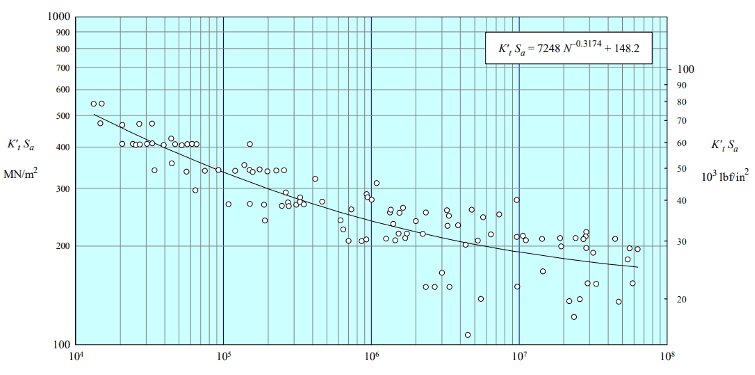Dr. John Hammar, ESDU Liaison Engineer, shares his experience working with ESDU customers to improve the product and advance innovation in the aerospace industry.
Accuris ESDU and Honda Aircraft Company collaborate on fatigue testing data
Accuris ESDU offers mutually beneficial technical awareness sessions for all customers, and in September 2023 I visited the Honda Aircraft Company facility in Greensboro, North Carolina. During the visit, I discussed unpublished endurance data for aluminium alloys and highlighted an often-overlooked Data Item FAT E.07.01, ‘Endurance of aluminium alloys (unclad) (In bending)’.
This Data Item presents the results of approximately 3500 fatigue tests on plain and notched specimens of unclad aluminium alloys tested under bending. These results have been analysed to produce S–N endurance curves of maximum alternating stress (Sa) plotted against the number of load cycles to failure (N).
The team at the Honda Aircraft Company included the senior manager of their Fatigue and Damage Tolerance department, Mark Ofsthun, who is also a valued member of the independent technical committee that validates and authorizes the Data Items for issue in the ESDU Fatigue – Endurance Data Series. They informed me that the endurance data for aluminum alloys such as 2024 and 7075 would be more valuable if the S–N endurance curves were plotted individually for each value of geometric stress concentration factor, rather than as plots showing the data for mixed stress concentrations for each alloy.
This feedback was relayed to Dr Downs, the ESDU Senior Engineer responsible for all content in this Series. Dr Downs worked through the test data, originally published by the Handley Page Company Ltd in 1958, and with the assistance of methods and software available in ESDU 97024, ‘Derivation of endurance curves from fatigue test data, including run-outs’, the data was re-plotted.

The updated Data Item was subsequently discussed and approved by the Committee, including Mark, and reissued as FAT E.07.01 Amendment C in June 2024. This version now contains 29 S–N endurance curves, including one for a naturally aged Al-Zn-Mg 7075 alloy shown aobve for example.
Accuris ESDU greatly values customer feedback, and this visit was both rewarding and enjoyable. “ESDU is a reliable source of very useful technical data accepted and used by the Aerospace industry,” Mark Ofsthun said after the visit.
During the visit, I also had the opportunity to closely observe the innovative HondaJet next-generation business jet. With a global fleet of over 200 aircraft, this aircraft features an over-wing engine mount, which is designed to not only reduce aerodynamic drag but also to benefit fatigue strength by loading the pylon supporting engine mounts in compression, rather than in tension as with conventional under-wing mounts.
Controlling fatigue testing costs with Accuris ESDU
Fatigue testing is essential for engineers to gain a critical understanding of how materials or components will perform in real-world loading scenarios over time. This is extremely important for aerospace, automotive and countless other industries, but businesses face a real challenge when it comes to acquiring reliable and validated fatigue test data.
Typical servo-hydraulic fatigue machines cost more than $100,000, which may not be affordable for many companies and institutions. Alternatively, sending materials to a third-party testing laboratory typically costs from $300 – $2,000 per test (plus the cost of the test specimens) and a wait time of several weeks or even months. The availability of existing validated, aerospace grade material data from Accuris ESDU is obviously crucial in helping to minimise our customers’ project costs.
The 2024 and 7075 aluminum alloys were first developed for aerospace applications in 1931 and 1935, respectively. Their continued use over ninety years later is largely due to how well we understand their capabilities. The validated endurance data available for these alloys (and others) in ESDU Data Item E.07.01 and the methods in ESDU Data Item 92030 “Fatigue propagation behaviour of short cracks in aluminium alloys” play a significant part in the operations of leading global aerospace companies such as the Honda Aircraft Company.
Ensure optimal product design, performance, safety and compliance with ESDU
Interested in learning more about existing unpublished, validated fatigue data and other similar content in the Accuris ESDU Fatigue Data Series?

